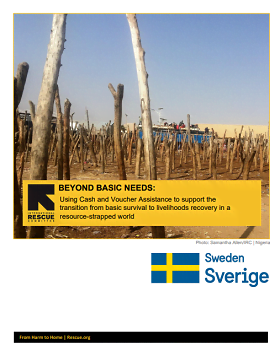Programas de transferencias monetarias sectoriales
Los PTM pueden ayudar a las personas en situaciones de crisis a abordar sus necesidades dentro de un determinado sector humanitario, tales como: agua, alimentos, salud, vivienda, medios de vida, o protección. Los PTM sectoriales pueden ser restringidos o sin restricción, condicionales o incondicionales, y normalmente serán proporcionados como parte de un paquete integral que puede incluir asistencia en especie o servicios.
Cada sector tiene que considerar distintas preguntas, retos, ventajas y riesgos cuando se trata de apoyar la recuperación de las personas dentro de su área de especialización. Esto requiere evidencias, herramientas, orientación y capacidad. Para cumplir los resultados sectoriales a través de los PTM también se requiere de una comprensión multisectorial de las necesidades y de la seguridad económica de los hogares (vea las Transferencias monetarias multipropósito). Mientras que algunos sectores tienen mucha experiencia en la implementación de los PTM y lo han hecho por muchos años, otros se están poniendo al día. La mayoría de los sectores humanitarios están comprometidos y han venido aumentando sus esfuerzos en los PTM sectoriales. El Grupo global de coordinación de clusters (GCCG, por sus siglas en inglés) también se encuentra coordinando el trabajo entre clusters para mejorar la utilización sectorial de los PTM.
Prioridades actuales
La CALP Network trabaja en estrecha colaboración con los grupos técnicos de asistencia en efectivo y equipos de tareas dentro de los clusters globales, que han estado definiendo sus prioridades y planes de trabajo del 2020 durante sus reuniones regulares. Una descripción general y detalles específicos de estas prioridades en cada cluster global está disponible aquí.
Subpáginas de los PTM sectoriales
-
Coordinación y gestión de campamentos y programas de transferencias monetarias
-
Educación y programas de transferencias monetarias
-
Seguridad alimentaria y programas de transferencias monetarias
-
Salud y programas de transferencias monetarias
-
Nutrición y programas de transferencias monetarias
-
Protección y programas de transferencias monetarias
-
Alojamiento y programas de transferencias monetarias
-
Agua, saneamiento e higiene (WASH) y programas de transferencias monetarias
Contenido destacado

Beyond Basic Needs: Using Cash and Voucher Assistance to Support the Transition from Basic Survival to Livelihoods Recovery in a Resource-Strapped World
Guidelines and Tools
Do you think of yourself as a “cash” person OR as a “livelihoods” person? An “emergency” practitioner OR a “recovery” practitioner? Or do you find yourself unsatisfied with the often narrow implications of these terms? We’ll never have enough funding to provide basic needs support to everyone who needs it for the entire time they are in need, even if we take advantage of the...

Looking into 2020: short overview on global clusters, CVA and the CALP Network
Presentation
Overview as 2020 begins:
• Significant progress and commitment from all global clusters on integration of CVA into their work.
• Significant interest in different regions and by some donors on sector-specific CVA.
• Challenges that remain:
o Dialogue: 1) Ensuring CVA specialists understand sector specificities and successfully bank on the technical expertise emanating...

Building Evidence to inform the Effective Use of CASH and Voucher Assistance in Emergency Sanitation and Hygiene Programming
Report
An analysis of 5 case studies of utilization of CASH/Voucher Assistance are presented and analysed in the attempt of building evidence on their utilization in emergency WASH Sanitation and HP programming. Findings and recommendations are provided on Coordination, Situation and Response Analysis, Program Design, Implementation, Monitoring and Evaluation.
Últimos recursos
No se encontraron resultados
No hay contenido disponible en este momento.


